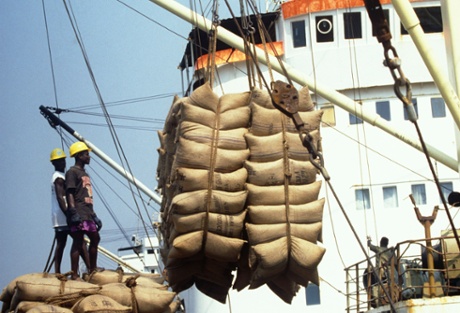
It’s been slow, but since 1980, developing countries’ share of world trade in manufactured goods has doubled to 20%. South-south trade is also increasing: in 2013, for example, India imported 8.67m metric tonnes of crude palm oil, mostly from Indonesia and Malaysia.
Over the last few decades, global trade has been a contentious issue. Some NGOs still oppose globalisation while others recognise that trade can play a powerful role in development, and are becoming increasingly involved in such issues.
But challenges – such as high transit costs, poor infrastructure and red tape – remain. “If you’re in Kigali and you buy a bar of soap imported from abroad, about 45% of the value of that will be transport costs,” said one speaker at a Guardian discussion on trade. “It can take up to seven days to get through the Malaba border; there’s sometimes a 25km queue.”
Corruption is also a barrier. “In the worst cases up to 20 signatures are required to obtain customs clearance of goods, all of which require ‘informal payments’,” said Professor David Widdowson, CEO of the Centre for Customs and Excise Studies. “I have also seen examples of 15 different government agencies playing some role at the border, all acting independently.”
One solution is the single-window system, which allows cross-border traders to submit documents for permits at one location. The introduction of this in Rwanda has led to a 40% reduction in clearance times.
What other ways can trade be made more effective and fair in developing countries? How can policymakers be encouraged to develop a more accountable and transparent trade system? And what is the role of NGOs within these developments?
Join an expert panel on Thursday 16 April, 1–3pm BST, to discuss these questions and more.
The panel
Rajesh Aggarwal, chief for trade facilitation and policy for business, International Trade Centre, Geneva, Switzerland. @ITCnews
Rajesh manages the International Trade Centre’s programmes on trade facilitation and integration of the business sector into the global economy. Previously he was India’s negotiator in the World Trade Organisation’s Doha Round.
Andrea Hampton, senior project manager - economic growth and trade, Crown Agents, Brussels, Belgium. @crownagents
Andrea specialises in global customs and trade reform project management, with a focus on technology in economic development.
Laura Frigenti, vice president - global development, InterAction, Washington DC, US
As part of her role at InterAction, Laura works on issues related to the SDGs and finance for development. Prior to this Laura worked at the World Bank where she held several positions relating to human development, job creation and labour markets, social protection and regional integration.
Ian Gillson, senior trade economist, World Bank Group, Washington DC, USA.
Ian is a senior trade economist in the World Bank Group Trade and Competitiveness Global Practice. His recent policy work focuses on regional integration, food trade, trade and the environment, and the links between trade and gender.
Jim Winkler, senior trade and investment advisor, DAI, Washington DC, USA. @DAIGlobal
Jim is currently project director for the UK’s department for international development’s FoodTrade in east and southern Africa and USAid’s east Africa trade and investment hub.
Aaron Cosbey, senior associate, International Institute for Sustainable Development, Rossland, Canada, @IISD_news
Aaron Cosbey is a development economist specialising in the sustainable development aspects of trade and investment.
Tim Aldred, head of policy and research, Fairtrade Foundation, London, UK. @timaldredpolicy
Tim leads policy and research for the Fairtrade Foundation, which works to secure a fair deal and sustainable future for 1.4m smallholder farmers.
Vinaye Dey Ancharaz, senior development economist, International Centre for Trade and Sustainable Development (ICTSD), Geneva, Switzerland. @ICTSD
Vinaye is senior development economist at ICTSD. Prior to this he was a principal research economist in the development research department of the African Development Bank.
The live chat is not video or audio-enabled but will take place in the comments section (below). Get in touch via globaldevpros@theguardian.com or @GuardianGDP on Twitter to recommend someone for our expert panel. Follow the discussion using the hashtag #globaldevlive.

